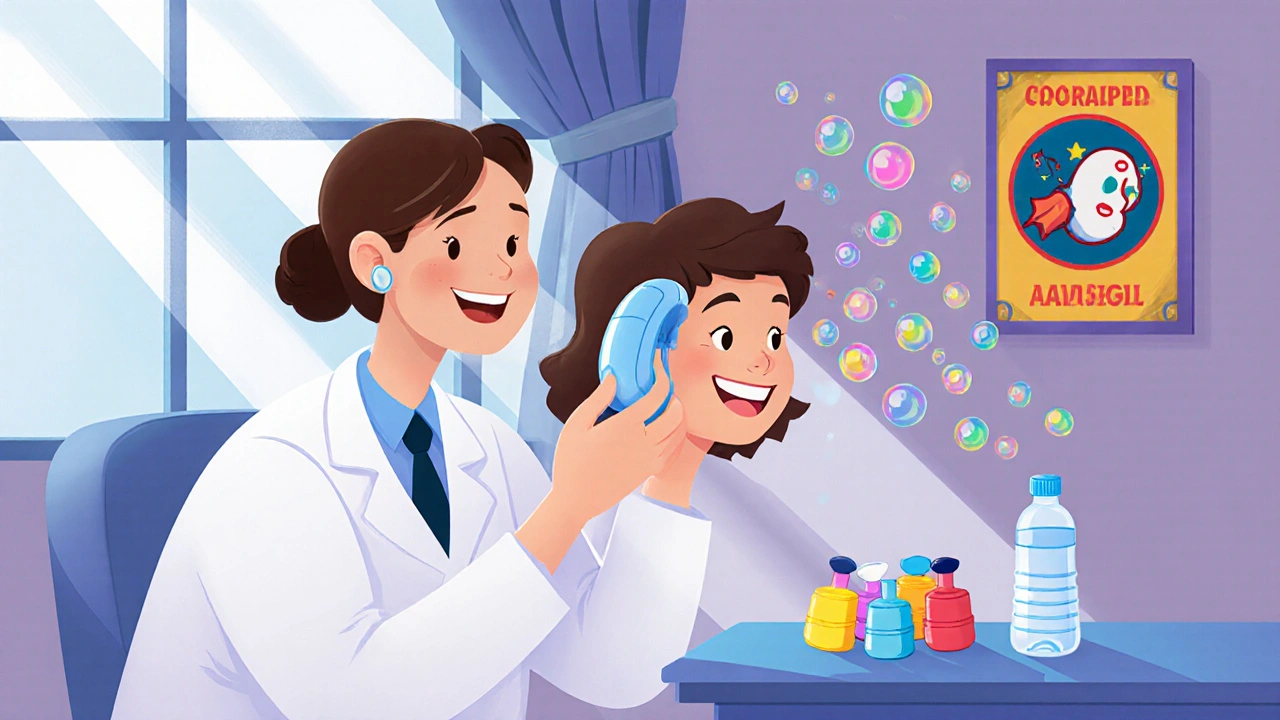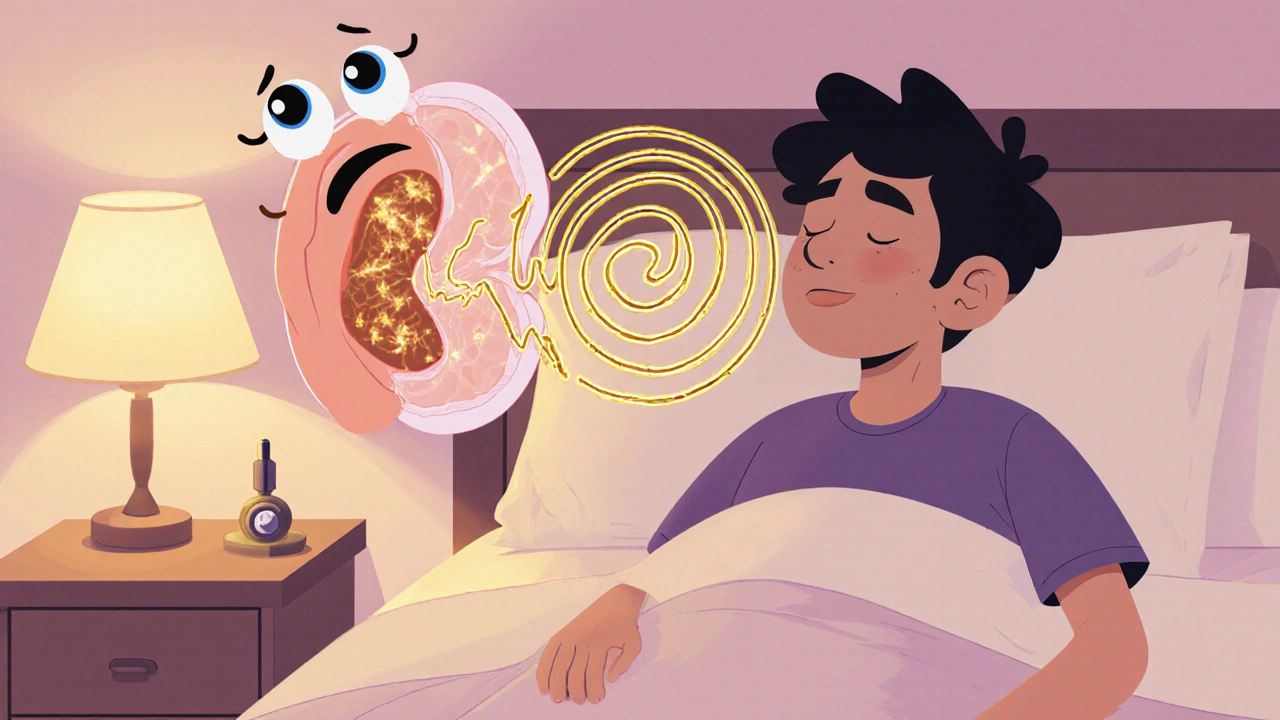Hearing Risk Calculator
Hearing Risk Calculator
Calculate your daily noise exposure to understand your risk for hearing loss and tinnitus. Remember the 60/60 rule: keep volume below 60% and listening time under 60 minutes.
Enter your volume level and listening time to see your risk.
Key Takeaways
- Tinnitus and hearing loss often share the same underlying damage to inner‑ear structures.
- Noise exposure, aging, and ototoxic drugs are the top three risk factors for both conditions.
- Early audiometric testing can spot hearing loss before tinnitus becomes chronic.
- Managing stress, protecting ears, and treating any underlying medical issue can reduce symptom severity.
- Professional evaluation is essential; home remedies rarely replace clinical care.
When a persistent ringing or buzzing fills your ears, you might be experiencing tinnitus, a condition where the brain perceives sound without an external source. While many think of tinnitus as an isolated annoyance, research shows it often walks hand‑in‑hand with Hearing Loss, a reduction in the ability to detect sounds across frequencies. Understanding why these two problems overlap helps you catch hearing damage early, choose the right treatment, and protect your ears for the long run.
What Exactly Is Tinnitus?
Tinnitus isn’t a disease itself; it’s a symptom that can arise from many sources. The most common form is "subjective tinnitus," heard only by the individual and linked to changes in the auditory pathway. Less common is "objective tinnitus," where a clinician can actually hear the noise, often due to vascular or muscular issues.
Typical descriptions include ringing, hissing, buzzing, clicking, or roaring. The sound may be constant or intermittent, high‑pitched or low‑pitched, and can affect one or both ears. In many cases, the brain amplifies tiny signals from damaged hair cells in the Cochlea, creating the illusion of sound.
What Is Hearing Loss?
Hearing Loss refers to a measurable decline in the ear’s ability to detect sound. It’s classified by degree (mild to profound) and by type: conductive (problem in the outer or middle ear), sensorineural (damage to the inner ear or auditory nerve), or mixed.
Sensorineural loss is the most common form linked to tinnitus. It occurs when the delicate hair cells in the Cochlea or the Auditory Nerve are damaged, preventing proper signal transmission to the brain.
How Do Tinnitus and Hearing Loss Interrelate?
Think of the auditory system as a microphone and a speaker. When the microphone (the cochlea) picks up less sound because of damage, the brain often cranks up its internal volume to compensate. That turn‑up can manifest as tinnitus.
Studies from 2023‑2024 show that up to 85% of people with moderate or greater sensorineural loss also report some form of tinnitus. The reverse is true as well: about 60% of chronic tinnitus sufferers have measurable hearing loss when they undergo a formal audiogram.
One key mechanism is “central auditory plasticity.” When input from the cochlea drops, neural circuits in the brain’s auditory cortex reorganize, sometimes generating phantom sounds. This plasticity explains why protecting your ears early can prevent both conditions from spiraling.

Major Shared Risk Factors
Because the same structures are involved, many risk factors raise the odds of both tinnitus and hearing loss.
- Noise Exposure: Repeated exposure to loud music, construction tools, or firearms can damage hair cells. The damage is often irreversible, leading to both a permanent threshold shift and tinnitus.
- Age‑Related Degeneration (Presbycusis): Around age 60, the cochlea naturally loses hair cells, making older adults prone to both symptoms.
- Ototoxic Medications: Certain antibiotics (e.g., gentamicin), chemotherapy agents (e.g., cisplatin), and high‑dose aspirin can injure the inner ear. Ototoxic Medications often cause a sudden rise in tinnitus followed by hearing loss.
- Medical Conditions: High blood pressure, diabetes, and thyroid disorders affect blood flow to the inner ear, raising the risk.
- Ear Blockages: Excess earwax or foreign bodies can create a conductive loss that mimics sensorineural patterns, sometimes triggering tinnitus.
- Acoustic Neuroma: A benign tumor on the Auditory Nerve can produce unilateral tinnitus and gradual hearing loss.
Diagnosing the Link
The first step is a thorough ear examination and audiometric testing. An audiogram measures hearing thresholds across frequencies and often reveals a “dip” in the high‑frequency range (3‑8 kHz) that corresponds with the pitch of the tinnitus.
Additional tools include:
- Otoacoustic emissions (OAEs) - test cochlear hair‑cell function.
- Auditory brainstem response (ABR) - evaluates neural pathways.
- Tympanometry - checks middle‑ear pressure and mobility.
When a patient reports sudden unilateral tinnitus, clinicians also look for signs of Acoustic Neuroma via MRI.
Management Strategies
Because the two conditions share causes, treating one often helps the other.
- Address Underlying Causes: Stop exposure to loud noises, switch to safer medication regimens, manage blood pressure.
- Hearing Aids: Amplifying external sounds can reduce the brain’s need to generate phantom noise, easing tinnitus for many users.
- Sound Therapy: White‑noise machines, specialized tinnitus‑masking devices, or customized sound tracks can provide relief.
- Cognitive‑Behavioral Therapy (CBT): Helps reframe the emotional reaction to tinnitus, reducing stress‑induced amplification.
- Medication: Certain antidepressants or anticonvulsants may lower tinnitus intensity, though evidence varies.
For patients with severe hearing loss, cochlear implants have been shown to suppress tinnitus in up to 70% of cases, likely because they restore robust auditory input.

Prevention Tips
Protecting your ears is the most effective way to keep both problems at bay.
- Use earplugs or noise‑cancelling earmuffs in noisy environments.
- Follow the 60/60 rule for personal audio devices: keep volume below 60% and listening time under 60 minutes.
- Schedule regular hearing check‑ups, especially after a major noise event.
- Stay hydrated and manage systemic health conditions (diabetes, hypertension).
- Consult a pharmacist before starting any new medication known to be ototoxic.
Comparison at a Glance
| Aspect | Tinnitus | Hearing Loss |
|---|---|---|
| Primary Symptom | Perceived sound without external source | Reduced ability to detect external sounds |
| Typical Onset | Often after noise exposure or medication | Gradual, can be congenital, noise‑related, or age‑related |
| Diagnostic Test | Audiogram + tinnitus pitch matching | Audiogram (pure‑tone thresholds) |
| Treatment Focus | Sound therapy, CBT, address cause | Hearing aids, cochlear implants, protect ear |
| Impact on Daily Life | Distress, sleep issues, concentration difficulty | Communication challenges, safety concerns |
Frequently Asked Questions
Can I have tinnitus without any hearing loss?
Yes. Some people experience subjective tinnitus while their audiogram is normal. In many cases, subtle high‑frequency loss is missed without specialized testing.
Does using a hearing aid cure tinnitus?
It doesn’t eliminate the phantom sound, but amplifying external sounds often reduces the brain’s need to generate tinnitus, providing noticeable relief for many users.
Are there any foods that help prevent tinnitus?
A balanced diet rich in antioxidants (berries, leafy greens) supports vascular health, which can protect inner‑ear blood flow. Reducing excessive caffeine and sodium also helps.
When should I see a doctor for tinnitus?
If the sound is sudden, unilateral, or accompanied by dizziness, seek medical attention immediately. Persistent tinnitus lasting more than three months also warrants a professional evaluation.
Can stress worsen tinnitus and hearing loss?
Stress heightens the brain’s auditory gain, making tinnitus louder and sometimes sharpening perceived hearing loss. Relaxation techniques can therefore improve both symptoms.
Understanding the shared pathways between tinnitus and hearing loss empowers you to act early. If you notice ringing or any change in your hearing, schedule an appointment with an audiologist. Prompt action can stop a minor annoyance from becoming a chronic health issue.


Angela Koulouris
October 21, 2025
Keep your ears safe and the ringing will stay quiet.
Harry Bhullar
October 22, 2025
It’s wild how often people think tinnitus is just an annoying buzz you can ignore, when in reality it’s a red flag that your inner ear is under stress. The hair cells in the cochlea don’t regenerate, so every loud concert, power tool, or ear‑bud marathon chips away a little more. When those cells die, the brain tries to fill the silence, cranking up its internal gain, which shows up as ringing or hissing. Studies from the past couple of years keep confirming that up to 85 % of moderate sensorineural loss patients also report tinnitus, so the overlap isn’t a coincidence. Even if your audiogram looks perfect, you might still have subtle high‑frequency loss that only specialized testing can catch. Ototoxic drugs like certain antibiotics or chemo agents can cause a sudden surge in tinnitus before you notice any hearing dip. Age‑related degeneration, or presbycusis, sneaks in after the 60s, and the higher frequencies fade first, often accompanied by a high‑pitched tone in the ears. Managing stress is crucial because cortisol spikes can make the perceived volume of that phantom sound louder. Protective gear-earplugs, noise‑cancelling earmuffs-are cheap insurance against irreversible damage. The 60/60 rule for personal audio devices is a solid guideline: keep volume below 60 % and listening time under an hour. Regular hearing check‑ups can spot trends before they become permanent, especially after a big noise exposure event. If you already have chronic tinnitus, hearing aids can sometimes dial down the brain’s need to generate that sound by supplying external input. Sound therapy, whether white‑noise machines or custom‑notched music, can provide a soothing backdrop that masks the ringing. Cognitive‑behavioral therapy helps rewire the emotional response, making the noise less distressing. In severe cases, cochlear implants have been shown to suppress tinnitus in a majority of patients, likely because they restore robust auditory input. Bottom line: protect your ears early, get professional testing when you notice changes, and don’t rely on home remedies alone.
Ashok Kumar
October 23, 2025
Wow, that was a lot of info. I get why the brain tries to fill the silence – makes sense. I’ve had ringing after a loud show and never thought about the hair cells. Good reminder to get my ears checked.
Jasmina Redzepovic
October 24, 2025
Everyone needs to understand that tinnitus isn’t just a “minor annoyance.” It’s a symptom of underlying cochlear pathology that, if ignored, can lead to irreversible sensorineural deficits. The data clearly shows a causal link: noise‑induced trauma, ototoxic pharmacology, and presbycusis are all convergent pathways that damage hair cells and alter central auditory gain. Ignoring this fact, especially in workplaces with high decibel levels, is tantamount to negligence. Protecting your auditory system with proper PPE isn’t optional; it’s a regulatory requirement. When you hear that persistent high‑frequency whine, treat it as a medical emergency rather than a nuisance.
Esther Olabisi
October 25, 2025
😂 yeah, totally vibe with the “medical emergency” part, but also, who has time for a full‑blown work‑place hearing test every week? 🤷♀️ Still, earplugs are cheap and don’t kill the vibe at concerts. Just saying, balance is key! 🎧
Ivan Laney
October 26, 2025
Let’s get something straight: the science behind tinnitus and hearing loss is not up for debate. Decades of audiological research, longitudinal cohort studies, and neurophysiological mapping have established that the inner ear’s hair cell degradation directly correlates with the emergence of phantom auditory sensations. It doesn’t matter whether you’re a DIY enthusiast using a power drill or a musician pushing amp volumes to the max; the result is the same-irreversible cochlear damage and a brain that compensates by amplifying internal noise. Any claim that “it’s just in your head” is a disservice to patients who suffer chronic distress, sleep disturbances, and cognitive load caused by that incessant ringing. Moreover, the regulatory frameworks in many industrialized nations already mandate exposure limits-so if you’re in a non‑compliant environment, you’re essentially endangering your workforce’s auditory health. And for those who think “I’ll just plug in earphones at 50% volume,” remember the 60/60 rule isn’t a suggestion; it’s a protective standard derived from epidemiological data. In short, we need to bridge the gap between public awareness and rigorous implementation of hearing conservation programs, or else we’ll continue to see rising rates of both tinnitus and sensorineural hearing loss.
Kimberly Lloyd
October 27, 2025
Listening to this, I’m reminded that our ears are like tiny gardens-if we overwater them with noise, the delicate flowers (hair cells) wilt. Yet, there’s always room for hope: protective habits, regular check‑ups, and a supportive community can nurture recovery. Embracing mindfulness and gratitude for quiet moments can also shift the inner narrative around tinnitus, turning it from a tormentor to a reminder to cherish silence.
Sakib Shaikh
October 28, 2025
OMG, did u see how the brain like *amplifies* the sound?? It’s sooo crazy! Lemme tell u, if u blast music and dont wear plugs, ur earz are GONNA be like "NOPE" and start ringing. Sooooo, be smart, be safe!!!
John Price
October 29, 2025
Nice summary, thanks for the info.
Nick M
October 30, 2025
Sure, it’s all fine until you realize the pharma industry never told you about the hidden ototoxic chemicals in everyday meds. They want you to stay dependent, so they keep the side‑effects secret. Keep your ears locked down.
Erika Thonn
October 31, 2025
if we think about noise as a wavey thing then maybe the brain is like a pool and the ringing is just a ripple left over from a big splash ha ha i guess mind works in funny ways.